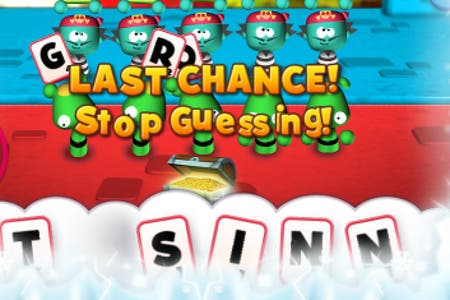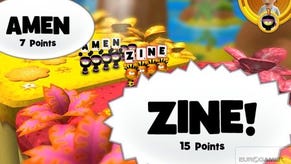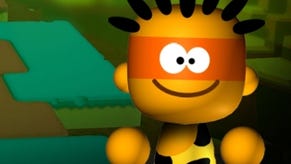Games of 2011: Quarrel DX
Words (11 Points) speak louder than actions (8 points).
Playing Quarrel for the first time is one of the strangest gaming experiences I've had for a while, and it was definitely unrelated to the 12th cup of tea of the day. Sometimes games feel so familiar and perfectly formed that you assume that you must have played them before in some nascent form, possibly sometime in the late 1980s before mullets were officially outlawed.
But no. Despite concerted internet searches and experimental primal scream therapy, it turns out that Quarrel wasn't some sort of gaming deja vu, but was thrust, fully formed, onto the unsuspecting App Store on August 25th 2011. Its unheralded arrival immediately galvanised the clever swines of the world into trying to describe it adequately. The best one yet ("Scrabble x Risk x Countdown") is also one of the most irritatingly concise, and also sums it up perfectly. As Denki amusingly points out, words (11 points) literally speak louder than actions (8 points).
There I was about to blather haplessly about its ingenious mixture of Scrabble wordplay and land-grab turn-based board game strategy, while some one else pressed the buzzer and won the internet. This also possibly explains why I am not very good at Quarrel and don't sip champagne on a yacht while dolphins pirouette in the background. But general inadequacy has never been a problem before, and it isn't here either. With Quarrel it really isn't about the winning but the taking part - at least not for habitual losers like me that enjoy flustered wordplay punishment. Besides, it's fun to tell you all over again why it's ace and thoroughly deserves a place in Eurogamer's hallowed Christmas games of the year selection.
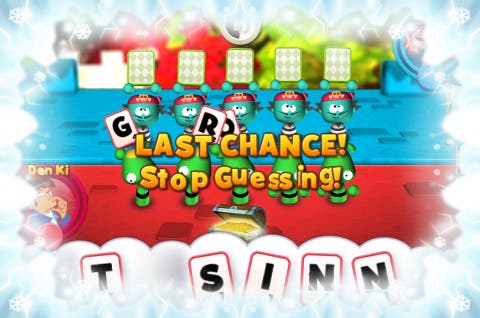
For those of you still unaware of its BAFTA award-winning charms, the crux of Quarrel is, like Scrabble, all about trying to craft the most valuable word out of a collection of letter tiles, each valued in precisely the same way that you'll be familiar with. That alone might not be especially interesting, but grafting these core mechanics onto a time-pressured head-to-head game of turn-based strategy most certainly is.
Whether you elect to sidle up for an elegant two-player quickie or opt for a sweaty Krankie-sized four-player marathon, it plays out the same way, with each of you in possession of an equal number of territories on an island map. To win, obviously, means capturing all of them by crushing your opponent with your devastatingly fast word formation skills - and the occasional piece of desk-thumping, temple-throbbing luck.
As simple as it sounds, it's always a wickedly finely balanced affair, and therefore a game that you never seem to want to stop playing. Like Risk, you have a finite number of troops (automatically) dished out across your territories at the start of the game, and once it's your turn to dish out the pain, you have to weigh up which territories are most advisable to invade.
Unless you positively sweat confidence (in which case, get in line for the next Old Spice ad), the most obvious thing to do is be a bullying git and win via weight of numbers. The basic gist of the battle is that the number of units you have on each territory translate to the number of letter tiles you'll get to fight with in that battle, so for instance, if you've got the maximum eight units, it'd be easy enough to claim a territory defended by a paltry five units. That said, it's still possible to pull off a flukey win if a) you're quick and form the word before your rival and, and b) you're lucky enough that the options are horribly limited.
Eventually, though, you'll either push your luck or run out of steam and play then passes to the next player in clockwise order. But even when it's no longer your turn, the fact that the game keeps you involved by allowing you to prove that you've got the fastest fingers. Apart from anything else, it's good practice, and sharpens the mind to keep training yourself under pressure.
Even if all of this was presented with all the panache of an errant child, it'd still be extra-brilliant. The fact that Denki has bothered to infuse it with such slick, characterful professionalism makes an absolute mockery of its £2.99 price tag. You're probably as bored reading about amazing cheap games by now as we are banging on about them, but, bear with me, Mr Impatient. A few years ago no-one would have batted an eyelid about paying £25 for a game with as much replayability as this. There's even a free version to check out if you're averse to the idea of prescribed fun.
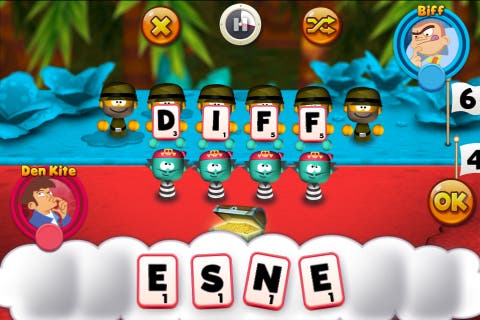
The fact that Scottish geniuses Denki had one hell of a faff even getting it to market probably tells you all you need to know about the kind of dunderheads responsible for bringing games to market in 2011. Go back 18 months, and the developer was forced to lay off most of its talented staff just to stay afloat. But with an equal portion of resolve and persistence, they've not only turned around a really bad situation, but shown what a ridiculous rejection it was in the first place.
Back then, on its Black Easter Monday, Denki's managing director Colin Anderson commented bleakly, and accurately: "This industry doesn't value good games. Players do, but the games industry doesn't." At the time, he was reminded exactly why it got out of the traditional publisher-funded model in the first place and escaped to the Siberian salt mines of interactive television games. But now, like so many of the world's best developers, the company has figured out, wisely, that going "straight to the people who play games and value games" is the way forward. With a bit of help from UTV Ignition, it has essentially flicked the Vs at those who wouldn't know a classic game if it personally fellated them in their own homes.
And if you've got some sort of pathological aversion to enjoying games on iOS platforms, then, worry not. Despite the XBLA version having been seemingly written off earlier last year, it's back on the agenda again, with PSN and Steam version to follow sometime in 2012. In generations to come, all but the beard-stroking sages of gaming lore will know of the struggle that Quarrel had, but as long as the cream rises to the top, it matters not.
